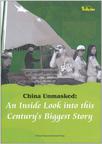追踪中国
出版时间:2011-6 出版社:五洲传播出版社 作者:中国新闻周刊英文部 著 页数:199
内容概要
On paper, China's bullish GDP, which
has propelled its national economy into the world's number two
spot, would seem a runaway success. However,entrenched economic and
political structures rooted in decades of planned economics are
proving difficult to shift, making China's vast national wealth all
but impossible to spread more evenly.
书籍目录
POLITICS, ECONOMY & ENVIRONMENT
Organized Crime: Above and Below Ground
A Tiananmen Memoir
Xinjiang Unrest: Media War over Xinjiang
Internet Justice: Netizens, the New Watchdogs
Gross Domestic Problems: Transformation or Stagnation?
Profile: An 'Angry Youth' of the Last Generation
Brand China: Lessons in Communication
Family Planning Policy: What's Next?
State-Owned News Organizations: Split Personalities
Water Crisis: Running on Empty
Solar Energy: Dirty Silicon
Hydropower Project: Stemming the Tide
GM Controversy: Selling Food Security
Shanghai Expo:Through the Looking Glass
Tobacco Control: Up in Smoke
PEOPLE, LIFE & SOCIETY
Chinas New Emigrants: New Trend, Old Problems
Migrant Youth: 100 Million Strong
Chinas Middle Class: Mediocre at Best
Han/Uyghur Mixing: Torn in Two
Homosexuality in China: A World of Shadow and Light
Political Awakening: A Story of a Young Patriot
Child Abduction: A Father's Endless Search
Yushu Quake: Between Life and Death
The Real Tiger Morns: Motherhood with Chinese Characteri
Flying Tigers: My Country, My Destiny
Zhang Jingsheng: Chinas Kinsey
The Rich List: I Don't Understand the Rich in China
CULTURE, ART AND HISTORY
Beijing Improv: Imported Theater
Mongolian Hip-Hop: From Riders to Rappers
Wu Guanzhong: Master of Truth
Martin Jacques: 'It's Going to Change the World'
Non-Profit Private Museum: Art for Art's Sake
U-turn of a 'Liberal Intellectual' : War, What Is It Good for?
Literature Awards: Behind the Trust Crisis
Mo Yan's New Book: Tackling Another Taboo
Public History: The Other Side of the Story
60th Anniversary of the Korean War: Shared Memories
Chiang Kai-shek's Secret Hoard: Golden Opportunism
章节摘录
版权页:插图:It took a decade for the square to reach the size that it is today. In November 1958,in the run-up to the 10th anniversary of the nation's founding, the Tiananmen extensionproject began. Ten months later, the "largest public square in the world," covering 44hectares, was complete. For the average Chinese person, Tiananmen is the heart of China,and the subject of classic patriotic songs that nearly every Chinese person knows. Childrenfrom all parts of the country learn to sing, "I love Tiananmen in Beijing. The sun rises overTiananmen," and are instilled with the dream to one day visit Beijing and see the square.Tiananmen is also a barometer of Chinese politics, and its relations with the world.Whether foreign leaders are visiting China, or Chinese leaders are reaching out to thepublic, Tiananmen plays a central role. And the changes in the way Tiananmen Squareis decorated for certain celebrations, or when leaders appear on top of Tiananmen Gate,usually carry political implications.Take, for instance, October 1, 1970, National Day. On this day, Man Zedong invitedAmerican journalist Edgar Snow to stand by his side during the Chairman's review ofthe parade. The large photograph of Mao and Snow standing together was printed onthe front page of the People's Daily newspaper, and it was meant to imply that China wasready to renew its relationship with the United States. But the signal was missed by theNixon administration. China had overestimated Snow's influence, and the Americans wereclueless to the way the Chinese expressed these types of messages. It was not until a yearlater, when Henry Kissinger made his first secret visit to China, that the US became awareof the intentions behind the gesture.In 1980, shortly after reform and opening up was launched, an "anti-personality cultcampaign" swept across the country and large portraits of Mao Zedong were removedfrom many public places in China, including the one hanging at the entrance of the GreatHall of the People in Beijing. In August of the same year, Italian journalist Oriana Falaccihad an exclusive interview with Deng Xiaoping, the paramount Chinese leader and thearchitect of the reform and opening up. Falacci asked Deng a rather provocative question,"Will the portrait of Chairman Mao on the Tiananmen Gate be there forever?"
编辑推荐
《追踪中国:社会热点(英文版)》是由五洲传播出版社出版的。
图书封面
评论、评分、阅读与下载
